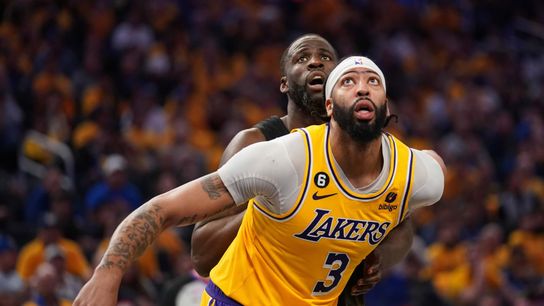The game started with Anthony Davis making shots with ease both at the cup and from distance. The game ended with Davis making a key stop on a Stephen Curry drive and a key rebound off a Jordan Poole miss.
In between, Davis validated what the Lakers have preached all season long. Their success or failure doesn’t just hinge on whether Davis stays healthy. It also depends on if Davis stays consistently dominant.
The Lakers snuck out with a 117-112 road win over the Golden State Warriors on Tuesday in Game 1 of their second-round playoff series, and the Lakers have Davis almost entirely to thank for it. He dominated on offense with 30 points while shooting 11-for-19 from the field and 8-for-8 from the free-throw line along with five assists and four offensive rebounds. He dominated on defense with 19 defensive rebounds and four blocks. And he dominated by exploiting all the Warriors’ defensive approaches on him, while also mitigating the Lakers’ other struggles.
Whether the Warriors defended him with single or double coverage, Davis still attacked the basket with aggression so that he could make easy layups, throw down lobs or draw a whistle to the foul line. When the Warriors gave him open mid-range shots, Davis canned them with ease. Davis played so well that the Lakers managed just fine with LeBron James with posting solid numbers (22 points, 11 rebounds) at an inefficient rate from the field (9-for-24) and from deep (1-for-8). Davis fulfilled his role so well that he made the Lakers’ initially atrocious 3-point shooting almost a nonfactor.
Consider how significant the Warriors (13-for-30) outshot the Lakers (1-for-8) from 3 through the first half. Yet, the Lakers still had a 65-54 half-time lead. Why? Because of Davis, who had 23 first-half points while shooting 9-for-10 overall and 5-of-5 from the free-throw line along with two blocks. The Warriors intentionally left the Lakers open so long as Davis didn’t produce. Though the Lakers often took the bait, Davis still punished the Warriors when he had his touches, even when he went against the Warriors’ two elite defenders in Draymond Green and Kevon Looney.
Davis’ offensive production took a dip in the second half, but that’s because the Lakers’ started canning their 3s. That partly traces back to Davis, who led the team in second-half assists (four) and found open shooters anytime he encountered double teams. When the Warriors attempted a late-game comeback, Davis was there to nullify it. Davis blocked Curry’s 6-foot- shot while the Lakers held a 114-112 lead with just 1:08 remaining. Davis then grabbed a defensive rebound off Poole’s missed floater while the Lakers nursed a 115-112 edge with 41.1 seconds left.
Don’t get it twisted. James still leads this team. The Lakers’ title hopes are doomed if he suffers an injury. The Lakers need any role player to fulfill the No. 3 position consistently. As for the Warriors? Perhaps things play out differently if Curry overcame an off night (27 points on 10-for-24 shooting). Or if Poole doesn’t take an ill-advised deep 3 while the Warriors trailed, 115-112, with 9.1 seconds left. Or if Warriors coach Steve Kerr gave second-year forward Jonathan Kuminga any chance to see if he could slow Davis down.
But how Davis plays can largely dictate how everything else operates. If Davis plays aggressively, James can conserve his workload and assume a facilitating role. If Davis plays aggressively, his teammates will likely find more open shots to make. If Davis plays aggressively, eventually the Warriors will run out of adjustments to counter him.
Maybe he won’t always score as prolifically as he did in Game 1. He likely would still have the same impact offensively as a decoy for James and the Lakers’ role players. He likely would still have the same impact defensively as both a rim protector, communicator and even perimeter threat.
Perhaps it is nave to expect Davis to replicate these dominant performances consistently. His injury history aside, Davis’ fluid aggressiveness level in past years has proven the difference between being a superstar and an All-Star caliber player. But in fairness to Davis, he has taken a greater leap this season since the Lakers upgraded their roster following the trade deadline. Coaches have observed Davis has become consumed with studying game footage and training in the weight room. Incumbent teammates have noticed Davis has become more vocal compared to any of his previous three seasons with the Lakers. And the improved roster has given Davis more space both to operate inside and to kick out to shooters.
So even if the Warriors have plenty of talent and experience to ensure a competitive series, Davis has what it takes to keep the Warriors on their toes. He outlined the blueprint in Game 1. The Lakers trust he can do the same thing moving forward.
